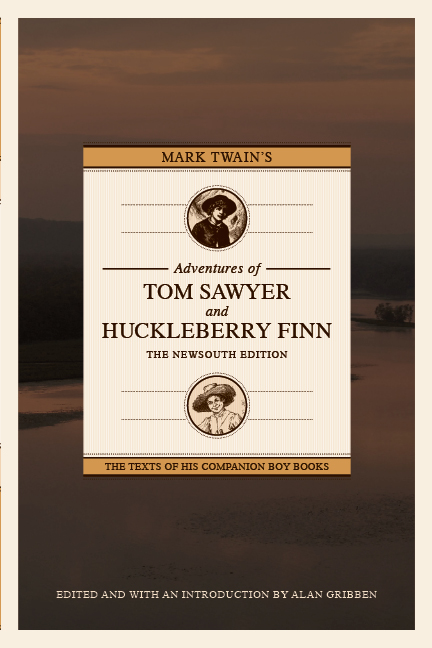 NewSouth Books is grateful for a posting by Rick Riordan, New York Times bestelling author of the Percy Jackson & the Olympians series and the 39 Clues series from Scholastic, to his Myth & Mystery blog about the controversy surrounding NewSouth’s Mark Twain’s Adventures of Tom Sawyer and Huckleberry Finn.
NewSouth Books is grateful for a posting by Rick Riordan, New York Times bestelling author of the Percy Jackson & the Olympians series and the 39 Clues series from Scholastic, to his Myth & Mystery blog about the controversy surrounding NewSouth’s Mark Twain’s Adventures of Tom Sawyer and Huckleberry Finn.
Riordan is a two-time Mark Twain Award winner for his books, and we feel he does a good job of summarizing the issues and responding thoughtfully and fairly to them.
In the post, Riordan notes that Dr. Alan Gribben, editor of NewSouth’s Twain edition, was his teacher at the University of Texas, and “was responsible for igniting my interest in Mark Twain and helping me find my own voice as a writer.” Riordan continues:
For the record, Dr. Gribben was an excellent teacher. He was very conscious of the racially charged language in Huck Finn, and was careful to put the novel in its historical context and explain Twain’s choice of words. In class, we spent several days discussing Twain’s language and having a free and open debate about what it was like to read this text in a modern multiracial classroom. As uncomfortable as the “n-word” might be, Dr. Gribben believed firmly that for our purposes, as college English students, the author’s text should be read as it was originally written. He even went out of his way to order editions of Mark Twain’s books that preserved the original page layouts and illustrations …
To be sure, as an author, I am instinctively opposed to censorship. I believe that the author’s intent and word choice should be respected. … If the debate were about replacing the language in all editions of Huck Finn, then of course, I would be opposed. But we’re not talking about that. We’re talking about offering an alternate version as a choice for classroom use. I don’t have any problem with offering teachers, students and general readers more choices, especially if it makes the text more accessible and causes less unease for students (and parents) who might otherwise have a hard time getting past the language to Twain’s message, which is a bitter indictment of slavery.
And let’s remember, tinkering with a classic text is hardly a new idea, nor is it usually done with as much delicacy and careful consideration. There are dozens of abridged “young reader†versions of Huck Finn in print that hack huge portions out of the text and also clean up or dumb down the language. There are numerous graphic novel versions. These are commonly used in classrooms without generating national headlines, and take much greater liberties with Twain’s story for worse reasons …
Of course, I’ll keep reading Mark Twain in the original. Most people will prefer this, and for good reason. Language is important. The author’s word choice is important. Judging from his classroom teaching and his many interviews, I have no doubt Dr. Gribben would agree. But if some teachers find a version without the n-word helpful for classroom teaching, I don’t have a problem with that. In fact, I would start the unit by explaining exactly how the text was modified, and why, and have a discussion in class about whether or not this was necessary. As I said earlier, this makes for a great teachable moment if the teacher has the dexterity to make use of it.
I have no doubt Alan Gribben understood that he was in for a storm of criticism when he announced the new version of Huck Finn, but he did it with the best of intentions, and I applaud his courage. Whether you agree with his decision or not, the controversy is sure to sell more copies of Huckleberry Finn and get more people reading the novel to see what the fuss is about. Mark Twain, who was no stranger to grabbing headlines, would surely approve.
You can read Rick Riordan’s entire post, “The Huck Finn Controversy,” at his Myth & Mystery blog.
